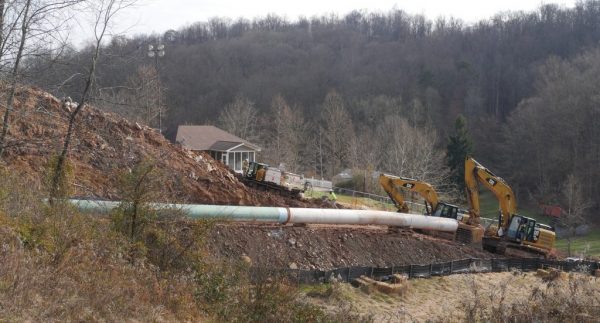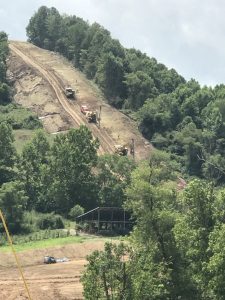- Like
- Digg
- Del
- Tumblr
- VKontakte
- Buffer
- Love This
- Odnoklassniki
- Meneame
- Blogger
- Amazon
- Yahoo Mail
- Gmail
- AOL
- Newsvine
- HackerNews
- Evernote
- MySpace
- Mail.ru
- Viadeo
- Line
- Comments
- Yummly
- SMS
- Viber
- Telegram
- Subscribe
- Skype
- Facebook Messenger
- Kakao
- LiveJournal
- Yammer
- Edgar
- Fintel
- Mix
- Instapaper
- Copy Link

How much money should landowners get when an oil or gas pipeline crosses their land?
As it stands, landowners receive a one-time payment roughly based on the length of the pipeline, with rates varying from $5 to $50 per foot or more for a Marcellus or Utica shale pipeline right-of-way agreement.
Is that really fair compensation?
Most landowners probably don’t think so. For example, in Virginia, 1.1 mile of the Atlantic Coast Pipeline will slice through Irene Leech’s 1,200-acre family farm, putting all the buildings squarely in the middle of the official—and some say underestimated— 220-yard incineration zone. (Leech shared information about her property in an e-mail to a pipeline-concerns listserv.) At 42-inches in diameter, it is larger than 99 percent of the pipelines across the nation. The 25-yard permanent easement alone will eat up 10 acres of the property, while the blast zone encompasses 88 acres.
The pipeline will turn her home into an industrial zone with all the health hazards, safety risks and inconveniences that come with it, and these dangers and drawbacks will never go away and will only increase year after year as the pipeline ages and requires more maintenance.
Meanwhile, an oil or gas pipeline moves product for profit across land, according to David L. Ganje, an attorney who wrote a blog post on whether Dakota Access Pipeline easements were a fair deal for land owners. At peak capacity, millions of dollars of oil will be moving through the pipelines every day, he said.
Unlike a public utility easement that crosses land to provide common services such as water or sewer or electricity, pipelines are in the business of making a profit and don’t provide any sort of a direct benefit to the land or the locals, he said.
In light of this, Ganje and others suggest that companies pay a yearly royalty for the use of the pipeline. That makes sense in the view of the benefits, the burdens and voluntary risks the various parties assume.
The pipelines’ owners, stockholders and employees all derive income without having their private property burdened in any way. The people who will be using the gas, whether on the east coast or overseas, will benefit with no burden to their private property. The county will receive some benefits from the property taxes collected annually though the revenue likely won’t offset the true social and environmental costs which will fall most heavily on the locals. The pipelines will also be a source of taxes at the state level in West Virginia and Virginia, though, once again, the money won’t be able to make up for the sheer ugliness and environmental degradation created by an extractive economy that will destroy beautiful rural areas and turn them into hazardous industrial deserts.
When it comes to risk, the pipeline companies are in the business of turning high risks in to high profits, and everything they do is calculated to maximize their profits. The investors, too, have taken on the risk of their own accord, and many probably have the option to invest or divest as they see fit.
But landowners in the path of a pipeline can’t take it or leave it. For most of them, their home and land likely represent their greatest asset. Their fair compensation ought to be based, not on the fair market value of their land, but on the value of the product moved through the pipeline.
Their private property is generating ample income for scores of other people. Why shouldn’t it generate income for the landowner? Why shouldn’t the land owner participate in the profits? Why shouldn’t the landowner receive as many benefits as the other beneficiaries whose homes are far, far away from the incineration zone?












Pipeline Easements – A Fair Deal?
by David Ganje, Ganje Law Offices
As natural gas exploration and production has increased, so too has the need to overhaul and expand the natural gas transportation system. In this article, I discuss pipelines running over private land, and will leave the important issues of pipelines on state and federal land for another day.
The proposed Northeast Energy Direct (“NED”) and Constitution Pipelines will ultimately connect the gas shale fields of Pennsylvania to the Northeast. Building a pipeline means crossing privately-held land. In the case of the NED and Constitution Pipelines, scores of privately-owned parcels will have to be crossed along the pipelines route through New York State. In order to facilitate construction of the pipeline, the operators behind the NED and Constitution Pipelines will negotiate easements with the owners of these parcels.
The relationship between public utilities and negotiated easements is nothing new. Easements may be granted to private businesses, such as a public utility company, to cross a land parcel in order to provide common services such as sewer access or electricity. Natural gas pipeline easements present a different situation. Setting aside for the moment the issue of whether the pipelines are a good thing economically and environmentally for the state, affected landowners should tread carefully.
Unlike a public utility easement, a natural gas pipeline moves product for profit across land rather than providing a direct benefit to the land. At peak capacity, millions of dollars worth of natural gas will be moving through these pipelines every day. Are affected landowners receiving fair compensation?
Traditionally in these situations, landowners receive “market value” of the land affected by an easement, which often includes money for reduction in agriculture output or other productive use of the land.
While this system makes sense under the common public utility easement paradigm, how does this process apply when the landowner’s property is the “transportation vehicle” for a commodity? How does one calculate “fair market value” when millions of dollars worth of product are flowing across privately-held land? Is a one time payment for an easement fair compensation?
Kinder-Morgan, the Texas-based company behind the NED Pipeline states that “Our goal, our practice and our overwhelming experience is to arrive at mutually beneficial terms and conditions with landowners.” However, what is to prevent a landowner from refusing to take the deal presented to them? The developer goes on to explain that, “[W]e always view eminent domain as a last resort only to be used if extensive consultation and negotiations with an individual landowner is unsuccessful.”
The term eminent domain should raise a red flag with any landowner along a pipeline’s proposed route. Eminent domain means “forced taking” though litigation. Under the doctrine of eminent domain, private property may be seized so long as the seizure is for a public purpose, and fair compensation is provided.
The concept of “public purpose” is liberally construed under the law. So, a seizure of property for a pipeline could be for a public purpose even when the direct benefactor is a private company. “Fair compensation” typically means that the taking party must provide market rate for the seized or affected land. In such cases, the focus is on production loss to the landowner rather than benefit provided to the operator.
The stage has already been set to allow for eminent domain seizures. Under existing federal law, the Federal Energy Regulatory Commission (“FERC”) must first approve the project. As part of this process, pipeline operators are required to apply to and receive from the FERC a certificate under the Federal Natural Gas Act. Part of the certificate application process requires the pipeline operator to show that their project is a “public convenience and necessity.” Should FERC find that such a showing has been made (which it almost always does), then case precedent will allow eminent domain proceedings to commence. So, if the easements are coming, for what terms should New York property owners be on the lookout?
When landowners are approached about an easement they are presented with a standard agreement. These agreements will not refer to any individualized needs or considerations. But they do contain many important legal terms.
Some examples of common terminology:
-“Temporary periods” are often mentioned. How long is temporary?
-Many agreements give an operator the right to conduct several activities (reconstructing, modifying etc.) at any time. However, the Landowner does not retain the right to renegotiate the type of access allowed. These activities could cause future disturbances to the Landowner’s use and enjoyment of their land. Is the landowner left without any recourse?
-Some agreements allow for the installation of “any appurtenant facilities.” What are these appurtenant facilities? Are they going to impact the Landowner’s use and enjoyment of the land?
While Landowners may feel pressure to sign, that does not mean that they must be left with a bad deal. Any proposed agreement should be reviewed with the help of experienced advisors. A landowner should always carefully consider the circumstances of his land and, importantly the future of his land.
________________________________________
State Senator Jeff Monroe has publicly criticized my article on the fairness of easement payments to landowners. Public discussion of public issues is a duty for all of us. It is not a privilege. A discussion of pipelines as a commodity transportation vehicle is the first premise of the argument in my article on pipeline easement payments. From this I ask the question of fairness-of-payment to landowners whose lands are used to transport a business commodity. My argument of fairness is fair game for criticism but I see nothing in Senator Monroe’s critique of my article going to the heart of my point: what is a fair price for using one’s land to send a private company’s inventory to market. Railroads charge a handsome price for such transportation. And those prices change with economic conditions. Should not the same concept of participation in the economic system apply to an individual’s land which is to be used as the vehicle of transportation? The position stated by state Senator Monroe or his speech writers criticizes my concerns about the fairness of allowing a private company to use the land in an ongoing for-profit enterprise and calls it legal hooey. Forty-two states have enacted new legislation or passed ballot measures since 2006 concerning problems with eminent domain as a taking of private property. Compensation to landowners in eminent domain proceedings has been notoriously small in amount. Five states have recently enacted legislation increasing the compensation amount. These state efforts must all be a bunch of political and legal hooey according to the Senator.
-David Ganje
Hi my name is Tim and I live in Chesapeake Virginia I have two easements in my backyard that takes up 75% of my yard. I’m not even allowed to plant a bush, I’ve been reading about compensation can anyone here tell me if the pipelines in this area are paying compensation to someone. I know the pipeline was put in in the 50s and the easement was received from the city of Chesapeake I was wondering if they still get compensation Chesapeake Virginia. And I believe we should get paid for the use of our line they cut down 27 beautiful trees. Left my yard looking like a disaster area stumps are still in it roots are still in it holes grooves from the equipment.
So under this premise, if a road goes thru your property you should be paid the value of all the cars using it??
Public road – then no! But a PRIVATE, profit-making use of your land? Then no reason that the negotiation of royalties should be off the table.
No comment here, just questions. 1) Once the pipeline is built, what else could be moved through it? 2) Who owns the land under the pipelines; can a company from another country own the land that the pipeline is on? 3) In time, is it possible the land and rights to access as a whole – from point to point – is as valuable, or more valuable, than the pipelines themselves?
Hi Walter: you ask some good questions! We are not regulatory experts, but it is our understanding – based on conversations with regulators – that a pipeline can be converted from so-called “dry gas” (methane), to liquified natural gas by-products, or oil. As for land ownership issues, a good real estate attorney would be the best person to ask your question, but West Virginia does have “split estate” laws in place – which could mean that an out-of-state, or multinational land holding company could indeed own the mineral rights and/or surface rights along the course of a pipeline. I’m not sure how to answer your third question, but I would think, in general, that it is possible that the land and access rights on all the property tracts necessary to complete a pipeline are at least as economically valuable as the pipeline itself. If you have further questions, or would like to discuss this at length, please feel free to contact me at Robin@ohvec.org
What about water lines ? I live 13 miles from the nearest town and apparently their water line runs along the inside PERIMETER of my ranch. It doesnt simply ‘cross’ it, but it literally follows my fence line. But its all on my property. Shouldnt it be outside my property,following the road ? As i was putting up a new fence, a city man approached me and told me i had to stop. They told me if i damage the line, i would have to pay a hefty fine. So, i dont see ANY benefit of them having their pipelines going across my place. Just risk for me. No benefit at all. Should i not be getting some kind of compensation as well ? It apparently feeds thousands of people in town.